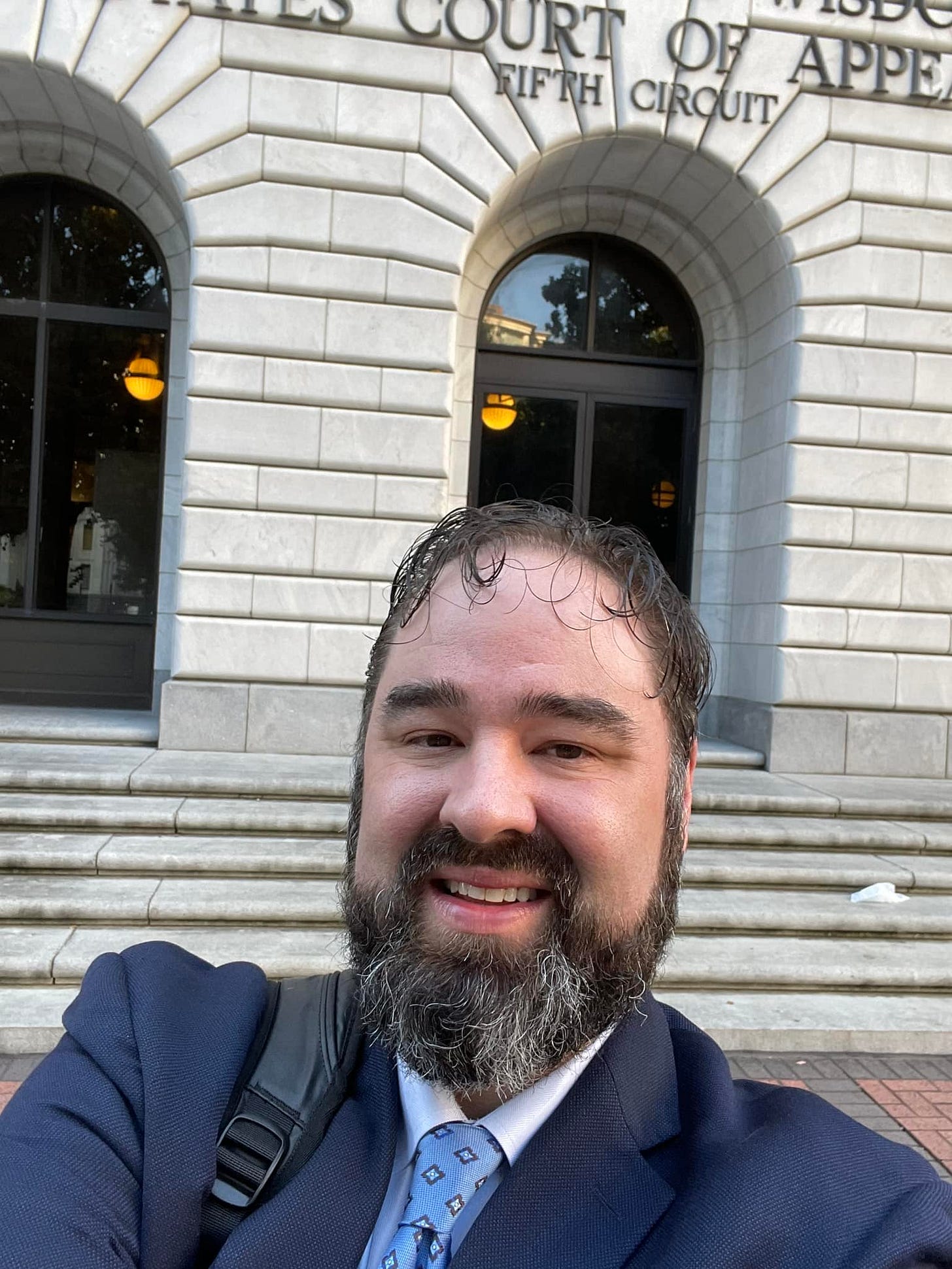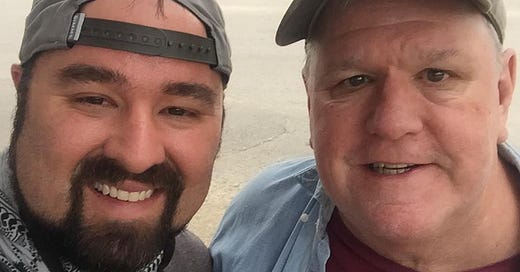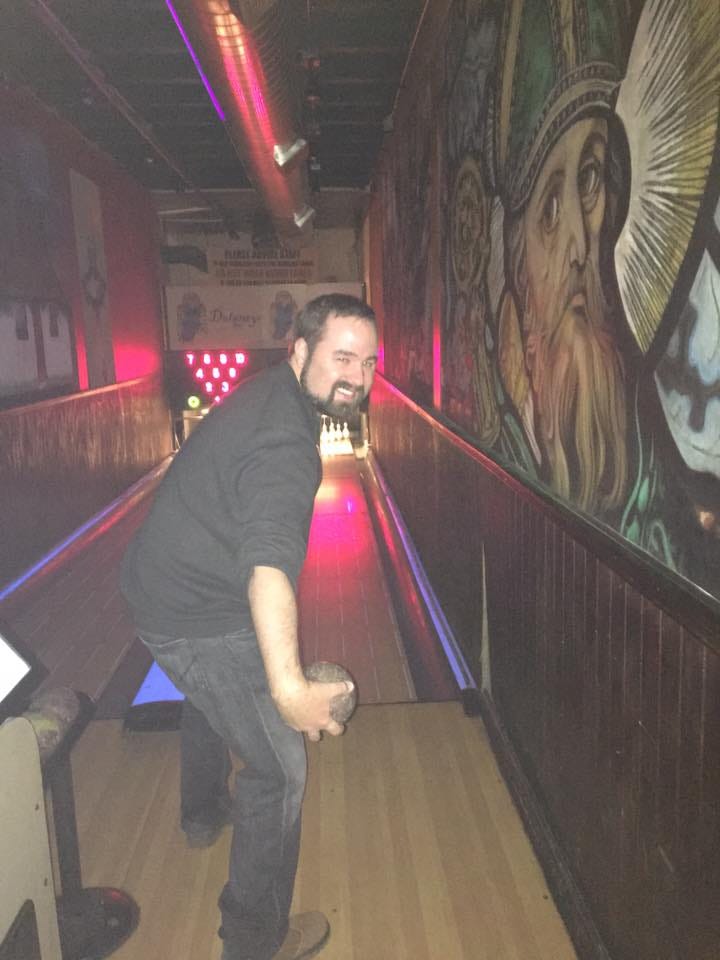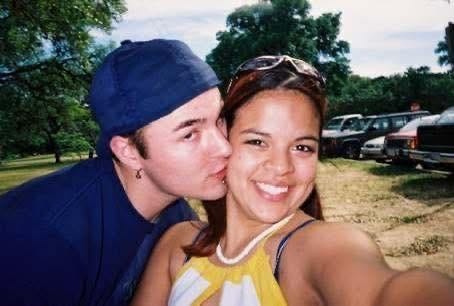This Father’s Day, I am reflective on the father figures in my life. My personal history is complicated, and this story will not make much sense unless you, dear and constant readers, know more about it.
My parents divorced just after I was born. Through dint of fate and manipulation of the court system, I did not have the relationship with my biological father I should have. He lived many hours away, and court-ordered visitation was not what it should have been in the 1980s.
My mother remarried when I was nearly three years old, to another teacher in our small town (roughly 10,000 people). My stepdad was not a bad guy and did as good a job raising a child as you could want, but he had his own faults and blindspots which we will get to shortly.
When I was 12, my mother manipulated me into asking that my father relinquish rights to me and allow my stepdad to adopt me. Doing so strained my relationship with my father for about four years, until I got a driver’s license and the constraints on my whereabouts went from nominal to theoretical. I was able to rebuild that relationship and my father and I are in a good place now.
In between these two, I had a number of grandfathers, because divorce runs in my family. I never got to know my paternal grandfather, who died when I was still a young child (thanks, Mother). My mother’s stepfather was always present, but on the fringes, and never what I could have considered a fatherly figure.
My maternal grandfather, who was always around, was not fatherly, either to me or to my mother, which probably explains a lot. He had the distant, 1950s father aesthetic. Present, was proud to show you off because of your achievements, but not directly involved. He never played catch with me, taught me to ride a bike, or had much to do with my upbringing rather than constantly exhorting me to perform well at whatever task I had in front of me.
This was of course counterbalanced by his wife, my mother’s stepmother, who helped raise me, was constantly there when I needed her, provided wonderful life advice, and in general was my favorite family member and the on with whom I felt the safest.
My stepfather’s father, on the other hand, may not have been related to me by blood, but he was certainly the most actively involved of my grandparents. As we spent quite a lot of time at his house or out at our lake house together, he was the one who taught me everything from boat maintenance to pitching a tent to how to shoot or fish or use a pocket knife. He taught me how to scour the sand dunes for arrowheads and other stone age artifacts. He did play catch with us (in multiple sports) and taught me how to throw a punch. And while I often felt like an outsider among my step-family, he (and his wife, my grandmother) never made me feel that way and chastised others when I was excluded.
How strange then, that I had such a good relationship with him and such a strained relationship with his son, my stepfather.
As I said earlier, as far as father figures go, my stepfather actually filled the role quite admirably. He was present, obviously cared for me (though not, perhaps, as much as my half-brothers) and certainly wanted to see me succeed. His issue was that he and I were destined to be two very different people, and overcoming that gap was often difficult, though I sense we both wanted to.
His major issue was that he was born one of those rare freaks of nature whose athletic prowess put them in the top 1% of global athletes. He was a star college baseball player, and, but for an unfortunate shoulder injury, would have easily had a career in professional baseball. As it was, he had a minor league career that fizzled out when his arm could no longer deliver the magic speed for pitches necessary.
Which was a shame, because, as I said, he was truly a gifted athlete, in almost any sport he played. Sure, he was probably a little small for modern football or basketball, but his agility, hand-eye coordination, and technical skill with handling almost any sort of sports equipment could not be denied.
The problem was, he did not recognize that this talent was unique to him and part of his genetic good fortune. No, because he worked hard all his life to cultivate these skills, he presumed that the difference between him and someone who did not possess his skills was the amount of work, and not the natural talent.
So when I (and my younger brothers) came out missing that extra je ne sais quoi that would have made us truly gifted athletes, he could not understand. He chalked our lack of success up to laziness and an unwillingness to work, when it was plain (to me, at least) that no matter how much work I put in, there was a definite ceiling on my athletic ability and it was far below his. I can, at best, be considered a passionate hobbyist of athletics. I could not have started in any college sport of my choosing.
So we often butted heads over this fact, with him accusing me of not working hard enough and me accusing him of demanding a level of performance out of me that I simply could not match. How correct each of us was remains up for debate; I am certain I did not devote every fiber of my being to athletics, because again, that was not my area of passion, and I am also certain he thought I could play ball like him if I just tried, when in no universe could I ever match his raw athleticism.
And with the same breath, I weep for the father who was never given a chance to be my father. And I am not sure whether my biological father was built for that; he never had any other children, so he was never put on the spot of having to learn how to be a dad. Having no kids of my own (for reasons I’ll make clear momentarily), I at least understand they do not provide you with an instruction manual as you take your baby home from the hospital, and that most parents sort of make it up as they go along.
My father never had a chance to try to make it up, and with as little parenting as my mother actually let him do, it’s little wonder he never seemed to get the knack for it, but that never left me as if my needs were unmet. I grew up fairly self-sufficient, and so his more distant, quiet love and support was often the balm I needed against the more present (ever-present) criticism and withering contempt I felt from my mother.
Which, again, let’s not be hasty to blame our parents for their flaws and faults. After all, they can only do what their own lives prepared them for, and I am certain my mother wrestled with a degree of disappointment in the provincialism of her own life, and feeling like maybe she had peaked too early. Perhaps even having her first child at 30 and condemning her to a life of being a schoolteacher in a small town weighed more heavily on her than I thought.
I always had a certain degree of ambition, wanting to rise above the circumstances of my birth and achieve a place in the world where my name was known and respected. My mother and step-father, both of whom had such potential but saw it fizzle in college, slunk back to their hometowns and took jobs which, while quiet and steady and the epitome of the American middle class, left little room for advancement. And when each of them had the experience and credentials to command better employment elsewhere, neither of them felt as though they could leave the small town to which they were committed due to their attachment to their own parents, who, in the way of all things, only got older and less healthy as time went on.
They made a kind of peace with this, finding honor and nobility in a simpler life, but this frequently put them at odds with me, since I would not choose to settle down, have a family, and content myself with coaching little league.

Because, again, I am cursed with a certain degree of ambition and a need for recognition beyond those things. That is not to denigrate them or say that those who achieve nothing more have not lived a good life; it was simply not my path. And my path did not include children. It included things like marriage, yes, but also world travel, attaching my name to big cases, and moving beyond the rural confines of my birth.
And when you do that, people naturally assume you have to look down on them while you are looking back at your past. Despite the fact that this was never true for me, it drove a rift between me and my mother and step-father, a rift I don’t think we can heal given the damage done in my early life.
Growing up autistic and weird in a small environment, particularly when ones parents were star athletes and prom queens, poses its own problems. In addition to being a failure (in their eyes) as an athlete, I was also a social failure. My friends, who were never good enough for my parents, consisted of outsiders and weirdos. I never fit in with the “right” crowd the way my younger brothers did. My letterman jackets were for things like debate or editing the school paper, not being a quarterback like my cousin. This made me an outcast even within the walls of my home.
Which is to say that parents often make the mistake of trying to shape their children rather than getting to know their own emerging personality. My parents would rather me have been boring and normal, enjoying watching and playing football and looking forward to the day I got my first little league coaching cap.
But that was never going to be me. I was never going to have a child. I was never going to be content with Sunday afternoons watching football on TV, bringing over burgers and hotdogs to throw on the grill. That was just… never my personality.
In that regard, I had too much of my father in me. And if we had been able to be honest at age 14, the four of us could have sat down and decided that a rural high school in the oil patch was not where I needed to be, that living with my father in the Dallas area and attending a private college prep high school would have been infinitely better.
But my mother could not have stood “losing” in the sense that I would not have been living with her. And I am quite sure my father would have felt entirely out of place trying to parent a teenager and probably would not have set tight enough boundaries. Chances are I would still have pulled through on my own, but you never know. Still, with hindsight being 20/20, I probably would have had a better trajectory through college and law school if I had been better prepared than my rural high school could have made me.
I would also have likely been able to bloom sooner. Those of you that know me now know me post-high-school. I was not a happy teenager. In fact, I was very unhappy, perpetually angry, often lost as to why people, even my friends, treated me the way they did. I did not look forward to waking up each day. I never had a place where I felt like I could just belong.
Thankfully, college life embraced me and all the weirdness I had, and gave me a social space and academic space to flourish. I met the woman who is now my wife, and for the first time I could remember, I was happy. This allowed me to relax, to open myself to new experiences, and to grow beyond the arrogant and angry monster I was becoming.
For life’s midpoint, it is easy to look back and pick out all the mistakes, to think of the way things should have been done better, to apply the wisdom of a lifetime and years of therapy to those heady, unguided early years where no one knew what they were doing and things went so very tragically wrong.
But here I stand, age forty-two, and on this Father’s Day think back to the fathers that shaped me, and wonder. I wonder whether I would trade a single one of those frustrating, heartbreaking, soul-crushing negative experiences if it meant I would not have had the positive ones, or if I might be a different person today than I am. Because that is the one truth I know as I sit here today; I am happy with the man I have become and the things I have yet to go on to do.
Would I trade all my fights and frustrations with my step-father if it meant his father would not have been in my life? Are the tears that I shed the price I had to pay to learn to tie a knot, or pull in a fish? Would I have rather spent my high school years among people who understood me, preparing myself to attend a better college, if it meant I might not have met my wife?
It is easy to wish certain things in your past were different in the hopes that it might lead to minor changes in your present, but that is not the way of things. Those minor changes in the past signify larger changes down the line. And even though the mistakes I have made and regrets I could feel would fill up pages of an autobiography, I cannot, as I sit here today, be upset with where I am and what I have achieved in life. If tomorrow were to be the end of my days on this planet, I would consider my life lived well.
And that is what digs at me the most; the great uncertainty of it all. In some nearby parallel universe, everything I have mused about here has happened. What I would not give to just peek in, to see how things are, from the safety and comfort of where I am now.
Or would I? Would it make me happier to know I am happier in this life? Or, God forbid, if I were happier in the other life, how could I continue here? I think, after a lifetime of studying philosophy, we cannot let our happiness hinge on the comparisons to what ifs. We must learn to take the tools of our present, and be happy with them, or strive to change them in such a way that we are happy.
Did I learn that truth from my step-father? Certainly not; I do not think he made his peace, truly, with a world in which he did not achieve his dream. Did I learn it from my own father? He seemed, at the end of his career, to have felt like he achieved what he wanted, and by all lights is enjoying his retirement, but is he happy? Hard to tell, for the same emotional dampness that confounds me seems to be inherited from him.
I know my step-father’s father was happy with his lot in life, despite a considerable amount of struggle. Maybe this was his last lesson to me, that happiness was not a state of being but a thing you do, every day.






